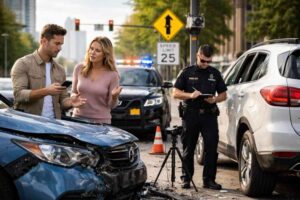Human trafficking is a bigger problem than many people think. Traffickers exploit people every day. They coerce people to work and slave against their will. If authorities catch the trafficker, the criminal justice system will try to punish them. They may even give restitution to the victim. When a victim doesn’t get compensation, human traffickers can be sued. So can third parties who benefited from the trafficking.
What is Human Trafficking?
 Human trafficking is basically making people work out of fear that they will be harmed if they don’t work. It can also be out of fear of other coercive tactics. These coercive tactics could be harming the person’s family or eliminating their housing. There are endless ways to coerce a person to work out of fear.
Human trafficking is basically making people work out of fear that they will be harmed if they don’t work. It can also be out of fear of other coercive tactics. These coercive tactics could be harming the person’s family or eliminating their housing. There are endless ways to coerce a person to work out of fear.
A person who is trafficked is exploited for their work even if traffickers pay for it because they do it out of fear. This means they have no choice or freedom. They may be afraid of being deported, being harmed, or being blackmailed.
Human traffickers aren’t typically forcing people to do average jobs, although that could be a possibility. The traffickers force their victims to do hard labor, traffic them for sexual purposes, and force them to be soldiers. Traffickers may force a person to marry someone against his or her will. Essentially, they are slaves.
One of the biggest challenges to stopping human trafficking is that it is difficult to find trafficked victims. They are usually too afraid to come forward.
Vulnerable Populations Prey for Human Traffickers
 Approximately 40 million people suffer some impact from human trafficking each year according to Human Trafficking Search. This astronomical number stems from vulnerable populations. Vulnerable populations are children, runaways, foster children, prostitutes, homeless people, immigrants, minorities, and the poor.
Approximately 40 million people suffer some impact from human trafficking each year according to Human Trafficking Search. This astronomical number stems from vulnerable populations. Vulnerable populations are children, runaways, foster children, prostitutes, homeless people, immigrants, minorities, and the poor.
Vulnerable populations are vulnerable because they lack the resources or know-how to get out of their situation. The fear of being harmed by leaving their captors is real. Traffickers may have access to law enforcement, law makers, or criminal elements that pose a real threat. That is why it is essential that law enforcement catch human trafficking rings , and they must hold traffickers accountable.
The Crime of Human Trafficking
Federal anti-trafficking law comes from Title 18 U.S. Code 77 that stipulates laws against peonage, slavery, and trafficking. People who hold or sell people against their will can be fined or imprisoned for many years. Depending on the type of trafficking, there may be a minimum 25 year sentence. The courts can extend this sentence to a life sentence if the trafficker kills the victim. This includes people who accept work from trafficked victims and those who engage in any part of sex trafficking.
Unfortunately, the true leaders of human trafficking rings are difficult to track down. Additionally, once the legal system imprisons them, their freed victims may fall prey to other traffickers. This is why the ability to have a civil lawsuit is essential to justice. The victims get compensation for their injuries.
Criminal Human Trafficking Cases
In October 2019, the courts sentenced a human trafficker to 25 years in prison. Nobody found him to be involved in a traffic ring. He exploited one woman by taking money she made by prostitution and only giving her drugs in return. She could not leave, and he made money off of her while abusing her. The abuse eventually led to him shooting her.
In a more elaborate human trafficking scheme, 3 Floridians were charged for creating a sex trafficking ring involving minors in multiple states. They recruited young girls to be dancers, and in return, they promised them luxury cars, clothes and lifestyle. They also had to have sex with clients. The traffickers opened fake companies to hide their actual business. One of the businesses was a non-profit that supposedly offered social services to challenged youth. The courts will impose a mandatory sentence of 15 years if they find the defendants guilty.
As you can see, human trafficking can involve two people, or it can be an elaborate business that harms many individuals.
Trafficking Victims Protection Re-authorization Act (TVPRA)
 The 2003 TVPRA is a re-authorization of an original trafficking victims protection act from 2000. In it, it gave victims the right to sue their traffickers for damages and attorney fees. As traffickers were making a profit from their victims, this gave the victims a chance to retain some of that profit for themselves. The law also allows the courts to compensate them for their losses.
The 2003 TVPRA is a re-authorization of an original trafficking victims protection act from 2000. In it, it gave victims the right to sue their traffickers for damages and attorney fees. As traffickers were making a profit from their victims, this gave the victims a chance to retain some of that profit for themselves. The law also allows the courts to compensate them for their losses.
One reason to allow for civil lawsuits is to fill gaps in the criminal justice system that fall short of providing justice. Although the law states that trafficking victims get criminal restitution, only 27% if victims actually get it. This means that traffickers get to keep the money, and the victims get nothing. Now, they can sue in civil court if the court doesn’t give restitution.
Third-Party Lawsuits
In many human trafficking cases, there is a third party that knew about the trafficking but benefited from it. The TVPRA allows victims to sue these third-parties as well.
In February 2020, two sex trafficking victims sued hotels where traffickers used them. They’re suing for $100 million. They complained that the hotels allowed obvious trafficking to occur. Men were in and out of the rooms. The traffickers and participants left sexual devices in the room. The women wore very little and were using drugs. It was sex trafficking in plain sight, and the hotels may ended up paying for it.
Civil suits against third-parties are one more way that the criminal and civil justice systems work together to try to recover damages for trafficking victims.
Recognizing Human Trafficking. Don’t Confront. Report.
Human trafficking can occur in your community, and it probably does. DO NOT CONFRONT a suspected human trafficking victim. You could put yourself or the victim in danger. Instead, report it to law enforcement or get help from the National Human Trafficking Hotline (888)373-7888.
How can you tell a person is being trafficked? It’s not easy. The person may have lost contact with friends and family, or they might be missing school. They may be anxious or use language that seems rehearsed at the direction of their trafficker. Those who have suffered physical abuse may have bruises or other wounds. It is very unlikely that the person will reach out for help.
Reporting suspected human traffickers and their victims can help to reduce the exploitation of people. Therefore, it’s like creating a Neighborhood Watch program because would-be traffickers feel more likely to get caught. Not only that, but your actions give a voice to victims who are helpless without effective intervention.
Have You Been a Victim of Human Trafficking?
If you have been a victim of human trafficking and have not been compensated for your losses, you need to contact a lawyer. Many lawyers who specialize in human trafficking cases will take your case pro bono (free). This means that you don’t have to have the means to hire a lawyer. When traffickers have exploited victims, they don’t have money for that. Instead, hiring the right lawyer for the job will get you the money you need to get back on your feet in a legitimate manner.
If you would like to speak to a personal injury lawyer about your potential lawsuit, contact Kirshner, Groff, and Diaz for a no obligation consultation about your case.



